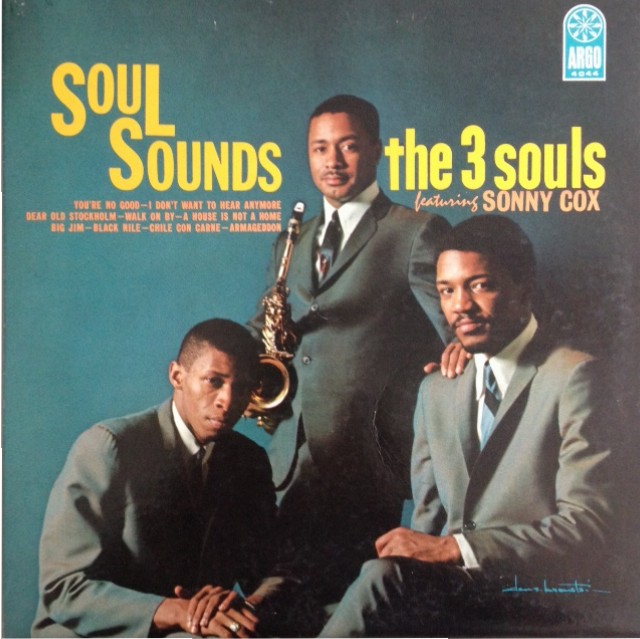Soul sounds, r&b sounds, jazz sounds, and whatnot on The 3 Souls album Soul Sounds.
Personnel
Sonny Cox (alto saxophone), Ken Prince (organ), Robert Shy (drums), Louis Satterfield (electric bass A1, 2 & 4, B1), Gerald Sims (guitar A1, 2 & 4, B1)
Recorded
on Februari 12, 1965 at Ter Mar Studio, Chicago
Released
as Argo 4044 in 1965
Track listing
Side A:
You’re No Good
I Don’t Want To Hear No More
Dear Old Stockholm
Walk On By
Big Jim
Side B:
A House Is Not A Home
Black Nile
Chitlins Con Carne
Armageddon
It is a most gratifying experience to delve into the Argo catalogue. It includes modern jazz artists like James Moody, Ahmad Jamal, Sonny Stitt, Art Farmer, Benny Golson, Gene Ammons and Lou Donaldson. On the r&b market, the subsidiary of Chess Records from Chicago was a strong player with Etta James. Soul jazz pianist Ramsey Lewis secured a high profile and considerable revenues for the label, which changed its name to Cadet in 1965. The 3 Souls weren’t out of place in a roster that also, at one time, included Baby Face Willette and Bunky Greene. Chicago and the Midwest had a large, receptive audience for hip and groovy jazz.
As it happens, The 3 Souls had Chicago as a base of operations in 1965, enjoying a residency at the Hungry Eye. The 3 Souls consisted of organist Ken Price, drummer Robert Shy, both from Kentucky, and alto saxophonist Sonny Cox, a native of Cincinatti, Ohio. The group released three albums, The 3 Souls in 1963, Dangerous Dan Express in 1964, which spawned a minor hit with their version of Hi-Heel Sneakers, and Soul Sounds in 1965. On the 1966 Cadet album The Wailer by Sonny Cox, Ken Prince plays organ. On Soul Sounds, the trio is assisted on a number of tracks by bassist Louis Satterfield and guitarist Gerald Sims.
Cox is a peculiar player and Soul Sounds a quirky album. The alto saxophonist, born in 1938, backed Jackie Wilson, Solomon Burke, Jerry Butler and LaVern Baker in the 50s. He proved to be the sporty type as well. In the 70s Cox switched careers and became a successful baseball and basketball coach on Chicago high schools. Undoubtedly, coach Cox was aware that it’s essential for a team to have a number of capricious players, often the creative ones who pull the chestnuts out of the fire. Cox the alto player possesses creative unpredictability himself. That’s good. Yet, his playing isn’t wholly convincing, uneven at times, short on meaningful ideas, we’re not talking Cannonball Adderley here, or Frank Strozier, or Sonny Criss… But it’s edgy, animated. And his tone has something of the ‘singing’ sound of Hank Crawford, though more vulnerable, thin.
Soul Sounds is a hodgepodge of sorts that includes Randy Newman’s I Don’t Want To Hear Anymore, Stan Getz’ Dear Old Stockholm, Burt Bacharach’s Walk On By and, yep, Wayne Shorter’s Black Nile ánd Armageddon. During the r&b, pop and soul tunes, also including You’re No Good and Bacharach/David’s A House Is Not A Home, Cox focuses on the melody with slight variations of timing and bending of notes. The meaty Dear Old Stockholm is enlivened by a boppish whirlwind entrance and a spirited continuation of furious licks and belligerent twists and turns. Cox holds on, perhaps to dear life, to these procedures during Shorter’s Armageddon, coloring his emotional solo with lurid ‘out’ notes.
Albeit a bit stiff on Kenny Burrell’s Chitlins Con Carne, the organ/drums sound is gutsy, certainly on the Cox/Prince original composition Big Jim, a hefty, Brother Jack McDuff-style cooker. The outfit seems most comfortable cooking in this vein. However, the liner notes explain that the group liked to perform the music they like, be it jazz, soul or pop. Something of that attitude certainly rubbed off on the recording of Soul Sounds, coherence be damned, a frame of mind we should perhaps appreciate more than we’re initially inclined to.
Soul Sounds is not available on Spotify unfortunately, so hunt for a copy to hear the highlights, or listen on YouTube to Chitlins Con Carne and A House Is Not A Home.

